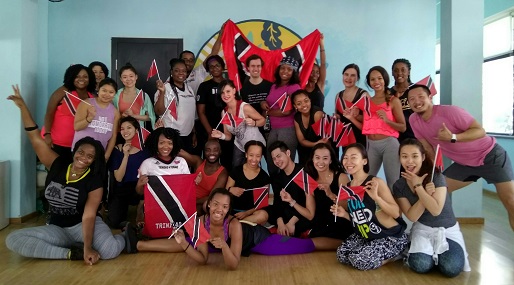By Vicki Cann, PhD Candidate at Communication University of China
The Republic of Trinidad and Tobago opened its embassy in Beijing in 2013 and has engaged in a series of activities to create greater awareness for the country’s rich cultural heritage in China.
The Embassy hosted “Soca Zumba”, to welcome Soca—the rhythmic, pulsating, waist gyrating music of Trinidad and Tobago. Elements, known as “Zumba”, were combined with contemporary Trinidadian dance moves to the tunes of Soca artists - Machel Montano and Destra Garcia.

With Trinidad and Tobago’s flag in hand, participants of Soca Zumba strike a pose. The event was held on February 25 at Caravan in Jianguomen.
The “Soca Zumba” session held on Feb. 25, was hosted by Anastasia Lejeune, a Zumba instructor in Beijing and Aaliyah Lewis, a Trinidadian student at the Beijing Dance Academy.
“The Embassy is honored to showcase our very own genre of music and the style of fitness that has swept across our country every year. It is our hope this introduction would give birth to a wave of Soca fitness classes all over Beijing and China. Dai Ailian, had became the Mother of Modern Dance in China under Chairman Mao. Thanks to her creative talent, Trinidad and Tobago has left an important mark on the culture and history of China,” said Ayesha Wharton, Chargé d’ Affaires of the Embassy.
Wharton and her team hope to revolutionize Beijing’s lifestyle scene as early as this summer.
History of Soca and Carnival
Throughout the Caribbean and the world, Trinidad and Tobago has become well known for its Carnival, a nationwide celebration that involves costumes, dancing, and merrymaking just before the Catholic Church observes Lent.
As a multi-ethnic and multicultural society, the roots of Trinidad & Tobago’s carnival stems from immigrants from France, Spain, Denmark and England, as well as indentured laborers from India and African slaves from West Africa.

The French Carnival on the island dates back to 1785, when French plantation owners hosted elaborate masked balls at their mansions.
But it was not until after the abolition of slavery in 1839 when Carnival celebrations started to resemble the Carnival festivities of today, since ex-slaves were free to parade through the streets. Although there were colonial attempts to repress the masses and ban carnival, the masquerade continued to grow and evolve.
Carnival as Tourism
Some may assume Carnival is just a small, local festival. However, it plays a significant role to reinforce the country’s national identity at home and abroad.
The University of Trinidad and Tobago offers a Masters program in Carnival Studies. It’s vital for the economy’s diversification, especially with the uncertainty of global energy prices.
The country’s policy makers are making strides to promote Carnival as tourism, since annual celebrations usually start in February. A 2012 publication by the country’s Ministry of Planning and Sustainable Development, said the Carnival industry had secured $US 25.5 million in 2006. By 2007, it is estimated that earnings could account for about 5% of the country’s GDP (gross domestic product).
The Embassy’s initiatives are helping the Chinese become familiar with the music and culture of Trinidad and Tobago. Efforts are underway to popularize Soca Zumba throughout China.

Participants dance to the pulsating beats of Soca music.
The country welcomes Chinese visitors to the twin-island Republic for Carnival. The relationship between China and Trinidad and Tobago has strengthened since President Xi Jinping visited the Caribbean Republic in 2013 and a reciprocal visit to China in 2014 was made by Kamla Persad Bissessar, former Prime Minister of the Republic of Trinidad and Tobago.

Vicki Cann is currently a PhD Scholarship recipient studying at Communication University of China. She spent 10 years in the U.S.A. where she attained her Masters in Communication. She also served as the former PR Officer for China Harbour Engineering Company's Americas Division in Kingston, Jamaica.
(The opinions expressed here do not necessarily reflect the opinions of Panview or CCTV.com)

Panview offers a new window of understanding the world as well as China through the views, opinions, and analysis of experts. We also welcome outside submissions, so feel free to send in your own editorials to "globalopinion@vip.cntv.cn" for consideration.















